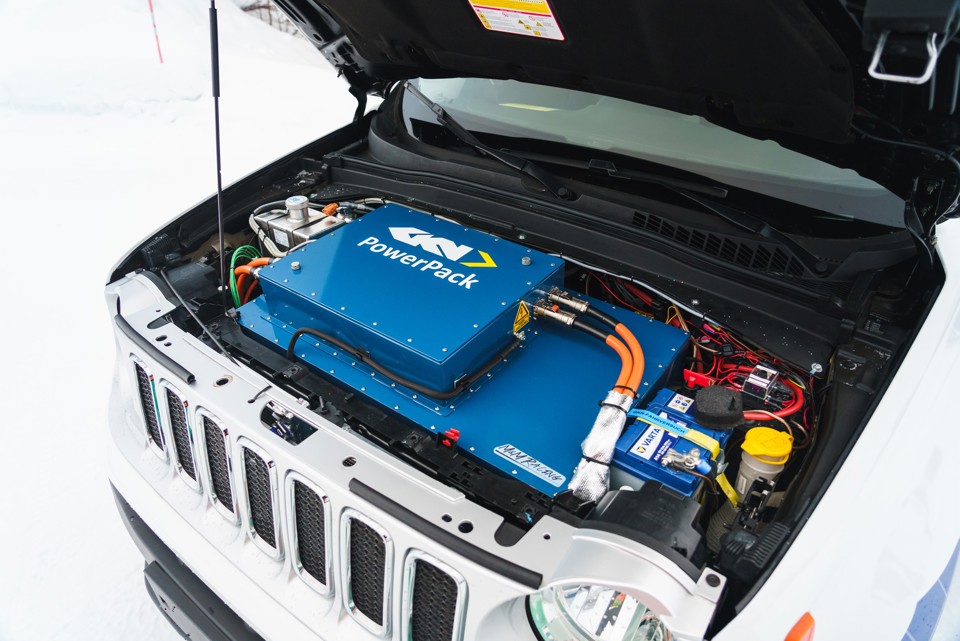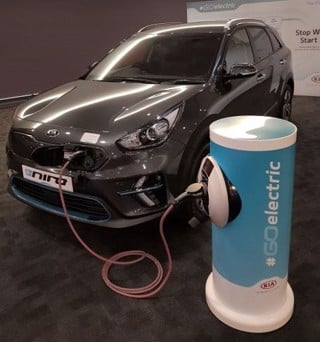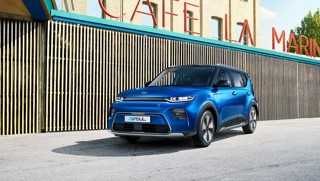GKN Automotive has unveiled a battery electric vehicle (BEV) with a two-speed transmission and torque vectoring on the front axle.
Based on a standard Jeep Renegade, the ‘GTD19’ demonstrator vehicle, which is described as a world first, is undergoing extensive testing at GKN’s annual winter testing programme in Arjeplog, Sweden.
The GTD19 is equipped with an optimised two-speed ‘seamless shift’ eTransmission and smart shifting strategy, which has the potential to extend vehicle range as well as provide greater torque, acceleration and a higher top speed.
Efficiency is further enhanced, says GKN, by the GTD19’s eAxle’s coaxial format, while exceptional stability and dynamic performance is possible thanks to the torque vectoring capability of GKN’s eTwinster system.
Hannes Prenn, chief operating officer of GKN ePowertrain, said: “This new technology demonstrator showcases how we are evolving and improving integrated eDrive technologies to help OEMs further improve efficiency, safety and driving dynamics.
“Within the last year, we have seen a 40% increase in the value of our eDrive order book, rising from £2 billion at the end of 2017 to confirmed business now worth £3 billion.
“Our dedicated focus on production and development of electrified drivelines will enable us to support the rapid acceleration in demand for BEVs equipped with all-wheel drive systems in the coming years.”
The GTD19 vehicle undergoing testing in Arjeplog integrates GKN’s two-speed ‘seamless shift’ gearbox with two speeds and torque vectoring.
The technology is related to the two-speed technology in last year’s ‘GTD18’ Mercedes-AMG GLA 45 test vehicle, which demonstrated the benefits of an eTwinster rear axle e-motor, two-speed eTransmission and torque vectoring by twin clutches; paired with a mechanical Twinster on the front axle.
The set-up in GTD19 provides pure electric power with two-speeds. The electric two-speed gearbox is configured to ensure the shifts are seamless, with minimal losses in power and torque and the potential for faster acceleration, improved efficiency and a higher top speed.
GKN’s Twinster torque vectoring technology delivers specific advantages for vehicle stability, agility and safety. Aiding modulation of the high initial torque of the electric motor, Twinster governs acceleration making it swift and smooth, while also providing greater lateral control and optimised front-wheel driving dynamics for both safety and driver satisfaction, says GKN.
The advanced eDrive system in the GTD19 replaces the Jeep Renegade’s internal combustion engine with a 120kW GKN e-motor, delivering maximum torque of 3,500Nm and vectoring of up to 2,000Nm to either of the front wheels when required.
Front-wheel drive applications of torque vectoring provide more noticeable benefits than rear- or all-wheel drive configurations, due to the relative ease of breaking traction in a front-wheel drive car.
Not only can the Twinster system keep the front wheels in check during acceleration, it can correct an understeer yaw moment experienced by a driver entering a corner at speed. The system prioritises torque delivery to the outer wheel helping to correct the natural understeer characteristic typically associated with a front drive vehicle.
GKN says that the eTwinster two-speed coaxial system can be easily integrated into existing vehicle platforms. It is readily adaptable for use in front-wheel drive, rear-wheel drive or all-wheel drive applications extending from entry-level electric city cars to plug-in hybrid luxury SUVs and fully electric all-wheel drive hypercars.
For the GTD19, all the drivetrain technology was integrated with ease into the existing vehicle platform without major modification, including both a GKN-derived electric motor and GKN-developed inverter controls, supplementing the company’s advanced eAxle, it said.
All software is programmed by GKN to enable seamless shifting of the two-speed transmission and torque control on the front axle, with minimal power and torque loss during changes.
GKN has already supplied complete eDrive systems to some of the most influential and successful plug-in hybrid programmes for OEMs including BMW, Mitsubishi, Porsche and Volvo.





















Login to comment
Comments
No comments have been made yet.